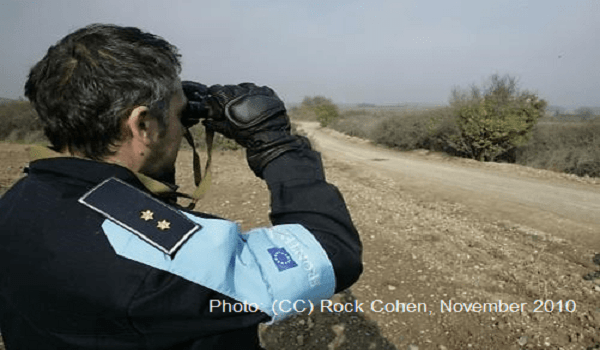Members of the European Parliament approved a report calling for respect for human rights at the EU’s external borders. The approval comes amid continued revelations of mismanagement and misconduct by the European Border and Coast Guard Agency, Frontex and ongoing violations by EU Member States.
A report by MEP and rapporteur for the Greens/EFA, Erik Marquardt entitled ‘Implementation of Article 43 of the Asylum Procedures Directive’ was approved by the European Parliament on 10 February with 505 votes to 124 and 55 abstentions. The report is based on an implementation assessment covering the use of border procedure under Article 43 prepared by ECRE. Commenting on the approval Marquardt underlined the need for an independent monitoring of the EUs external borders given the widespread human rights abuse and pushbacks perpetrated by EU Member States. The UN Refugee Agency (UNHCR) and the International Organization for Migration (IOM) has recently released statements strongly condemning violations at the EUs external borders. Marquardt further noted: “”The Frontex files revelations show that there are serious issues with the governance of the EU’s border agency that need addressing without delay”. MEPs from the Civil Liberties, Justice and Home Affairs (LIBE) agreed on 29 January to establish a Frontex Scrutiny Working Group to investigate mounting reports of the agency’s role in the illegal ‘pushbacks’ of asylum seekers.
A Preliminary Report of the Frontex Management Board Working Group set up on 10 November following media reports of alleged involvement of the agency in pushbacks from Greece to Turkey has been released by Statewatch. The report entitled ‘Fundamental Rights and Legal Operational Aspects of Operations in the Aegean Sea’ notes that five incidents needs further review: “partly due to unclear data provided by Frontex” and that it has: “identified a lack of monitoring in the reporting system of Frontex. In fact, there is no mechanism installed in Frontex which would have the purpose of identifying problems in the reporting practice (i.e. reports that are incomplete or not conclusive, frequent (need for) re-classification of reports, inconsistencies in the follow-up given to the reports, etc)”. Further, the working group recommends revisions of the Serious Incident Reports (SIR) mechanism insisting that they must be directly reported to the Fundamental Rights Officer rather than the Frontex Situation Centre and underlining that: “A too restricted classification regime reduces transparency”.
The report ‘Lobbying Fortress Europe – The making of a border-industrial complex’ published on 5 February by Corporate Europe Observatory concludes: “Access to document requests reveal a disturbing trend by which arms, surveillance, and biometrics companies are being given an outsized role – unmatched by other voices – in shaping EU’s border control regime”. According the report: ”These corporate interests are not neutral parties but de facto seek to shape Frontex’s approach to border control in their interests, and benefit from procurement contracts” further the denial of lobby contact by Frontex and according lack of transparency, and serious human rights implications at the borders are also underlined.
Frontex with a current budget of almost 500 million Euro in EU funding has faced scrutiny over excessive spending and is currently under investigation by the European Anti-Fraud Office (OLAF) in a case of possible fraud related to the agency’s IT contracts. Reportedly, morale is low in the standing corps of Frontex of police officers, planned to reach 10,000 members over the coming years, due to shortage of vehicles and equipment and lack of clarity over their legal mandate: ”Do something at last, or soon no one will work here anymore,” one border guard warned in an internal agency call according to the Spiegel. The German outlet researching Frontex in cooperation with media organisation Lighthouse Reports and the newspaper Libération, states that the pressure on head of Frontex, Fabrice Leggeri is growing with increasing concern from the Commission as well as MEPs over the management of the agency.
The European Ombudsman, Emily O’Reilly has closed a case launched following a complaint against Frontex filed by Statewatch in 2019. According to a statement released by StateWatch on 11 February: One outcome is that Frontex and Europol have committed to improving and updating their public registers of documents, which will facilitate democratic and public scrutiny of their work”. However, Statewatch regrets that: “the Ombudsman approves of restrictions placed by Frontex on the right of non-EU citizens to file requests for access to documents”.
For further information:
- ECRE, Frontex: Critique and Scrutiny Continues, December 2020
Photo: (CC) Rock Cohen, November 2010
This article appeared in the ECRE Weekly Bulletin. You can subscribe to the Weekly Bulletin here.

